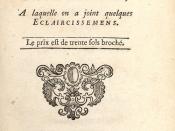The following quotation is one that characterizes the Philosophers of the 17th and 18th Centuries: 'Politically and socially, most propagandists of the Enlightenment like the scientists whom they popularized were conservatives. Intellectually and morally, they undermined the values of the traditional society in which they lived and prepared its collapse.' This quotation, though, is not totally correct, nor incorrect. Most 'propagandists,' or philosophes, were not politically or socially conservative, but in fact, mostly wanted change, if either by radical ways or not. Their intellectual and moral outlook of society, though, did cause much change in the society itself, and eventually led to some collapse.
They define a conservative in Webster's Dictionary as, 'one who wishes to preserve traditions or institutions and resists innovation or change.' Many philosophes wanted to change certain political aspects of their countries, but did not want to change them through radical approaches, such as revolutions. Nonetheless, two main philosophes that desired to change certain political and social aspects of their state were the Baron de Montesquieu, and Jean-Jaques Rousseau. Montesquieu believed in a monarch, but also introduced the idea that it's power should be limited. Rousseau, on the other hand, believed in changing social roles by making an individual less important, and placing the larger community above the individual. He also aimed for political change as well.
Montesquieu considered the idea of having a limited monarch. In his work, The Spirit of the Laws, he believed that one form of government could not be placed on every state. He argued that each country's form of government depended on different factors, such as size, population, and economic structure. His view of France suggested that the monarch's power be limited by institutions such as the aristocracy and the towns. This would preserve the liberties of the citizens...



Philosophers of the 17th and 18th Centuries
The information in the essay is quite good and useful, however it seems t be plajorised, where are the references?
The layout (body etc) of this essay is quite good.
4 out of 4 people found this comment useful.